
OK, so this post is written through the eyes of a boomer on a cruise ship meaning you only get a thumbnail sketch of places visited. Having said that, it was ample time to get a taste of Ho Chi Minh City (previously Saigon), Vietnam and its culture.
With a great guide name Foo and feeling like millionaires, (our wallets were loaded with 2,700,000 Dong, equivalent to $US100) we headed off to explore the city.
NB – Foo also doubled as the driver’s assistant. His task was to direct traffic so the bus could get through roads clogged with motorbikes!
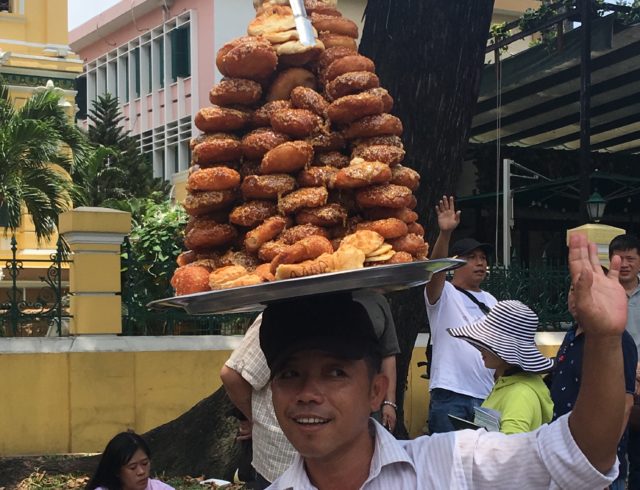
The name of Ho Chi Minh can be confusing. Many locals still refer to the city as Saigon (pre Vietnam War) but the younger generation lean more towards its current name of Ho Chi Minh.
“Paris of the East” is another name given to this city, which is full of energy and spicy aromas. This is because the French ruled Vietnam as part of its huge colony that formed French Indochina in 1887. France was defeated in the First Indochina War and the proclamation of Vietnams independence was made in 1954.
These snippets of history will always help you with trivia on cruise ship afternoons!
This also accounts for the French colonial architecture on many prime city buildings. The other similarity to Paris is that Ho Chi Minh is broken up into districts – there are 12 altogether.
Cruise ships offer a range of tours, but for a broad overview in the short time allowed we decided on a city tour of Ho Chi Minh.
As the city is approximately a two-hour drive from the Port of Phu My, it’s a good idea to take tours organised by the cruise ship. This particular port is a bit difficult because taxis aren’t allowed portside plus there are no free shuttle buses.
Foo’s constant and colourful descriptions of life in Ho chi Minh made the long drive shorter!
Being the second largest rice-growing country in the world you pass kms of rice paddies on the way from the port. April is a dry month and ideal for harvesting the crop. After the harvester has slashed the rice, it’s then loaded onto motorbikes and taken away for drying and processing.
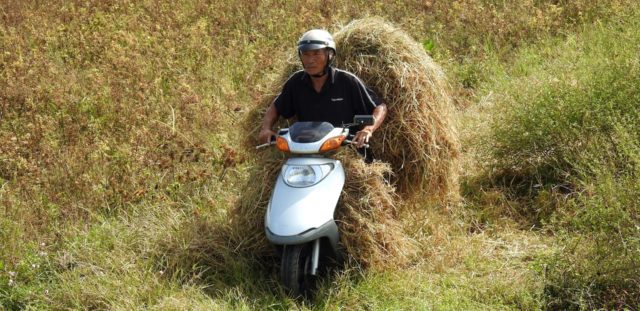
Did you Know:
Most of Asia relies on motorbikes for transport and seeing masses of bikes all shuffling for their spot of bitumen is quite an eye opener.
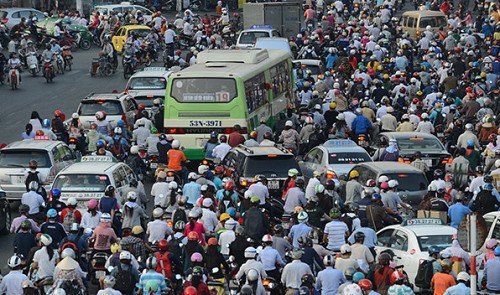
Many have two, three and four people on the bikes at once plus all sorts of items on the back seat. Then there’s the boxes, bags and baskets hanging off every which way. Some of the more interesting sights were:
Ho Chi Minh City has a population of nine million and more than seven million motorbikes – no wonder it’s called the Motorbike City of the World. Female riders are covered from head to toe in all sorts of fashion statements leaving only their eyes, a small patch of forehead and the bridge of their nose open to the weather. Can you imagine being covered like this in hot and humid temperatures of 30 degrees Celsius?
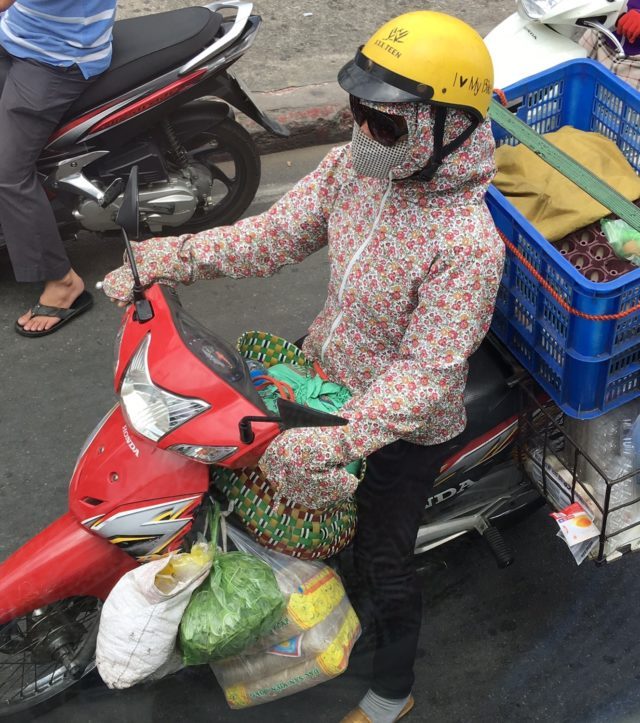
After enjoying all the motorbike entertainment we stopped at the Giac Lam Pagoda. Originally built in 1744 this interesting structure incorporates much of the original, and intricate, woodwork along with 118 statues made of wood, bronze and cement. The pagoda (also known as a temple) was remodelled in the early 1900s and is the oldest Buddhist temple in Saigon. There are many artefacts to capture your attention and you need to keep an eye on the time so you don’t miss the rest of the tour.
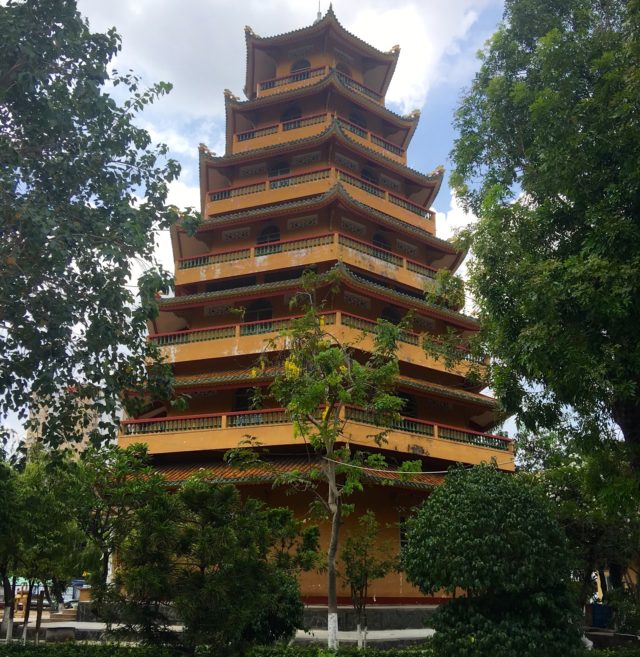
Near the pagoda you’ll see trees on the footpath that are commonly called “The Cannon Ball” tree.
The botanists in the world call it a couroupita guianensis but just try getting your tongue around that name!
The fruit is large, round and heavy like their namesakes, and look like a coconut. When the fruit falls to the ground it makes a loud noise and bursts open to reveal lots of small seeds in a very SMELLY white jelly substance. In contrast, these rare trees have the most exquisite flowers, both in appearance and smell.
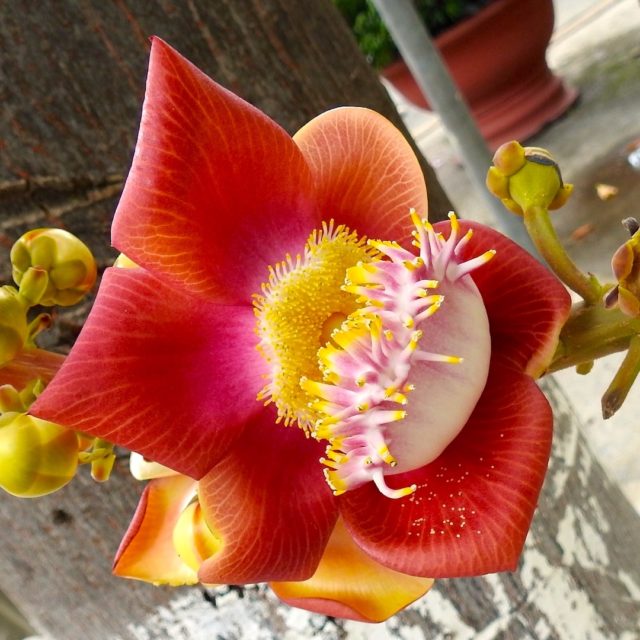
The trees are very significant to the Buddhist culture, but be wary of falling fruit because they could cause a severe injury.
Chinatowns are exciting wherever you are in the world! Cholon used to be a city in itself until it was merged with Saigon in the 1930s and was once one of the biggest in the world. During the war it was filled with American deserters and traders on the black market!
As you wander the streets of the Binh Tay Market in the centre of Cholon your senses will be blown away by the huge range of local spices, fruit and nuts on sale. Watch while shopkeepers painstakingly scrape large sticks of cinnamon into shavings for use in cooking. There’s nothing like the smell of fresh cinnamon on your hands to conjure up visions of tasty Vietnamese dishes.
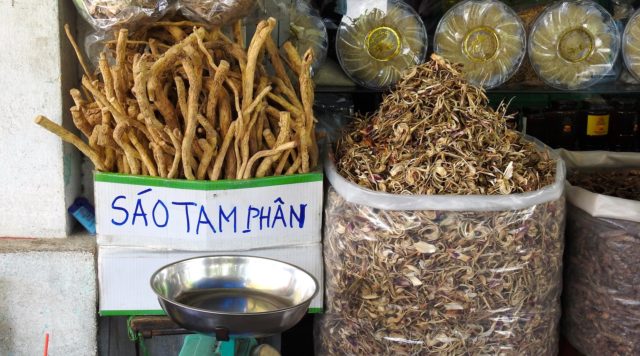
There’s so much delicious street food on offer in the markets. This gives you the chance to sit and watch life in Ho Chi Minh while trying to juggle chopsticks. (Forks are always on hand for those who don’t want this challenge).
Then not far away is the Ben Thanh Market where you are less hassled by hawkers because the stalls are not selling souvenirs and touristy stuff, mainly clothes, fabrics, watches, luggage and electrical goods.
In the downtown area (District 1) we came across the late 19th century Saigon Central Post Office which is so reminiscent of Paris.
The Post Office is one of the oldest buildings in Ho Chi Minh City and was built around 1886 and, of course, designed by famous French architect, Alfred Foulhoux
Inside the building, the ceiling is worth more than a glance. It’s a huge arc with a large mural of Ho Chi Minh at the far end making the building look really impressive. The arched windows, creatively designed green window shutters and intricate ironwork at the main entrance, again make you think you’re wandering through Paris and not a major city in Vietnam.
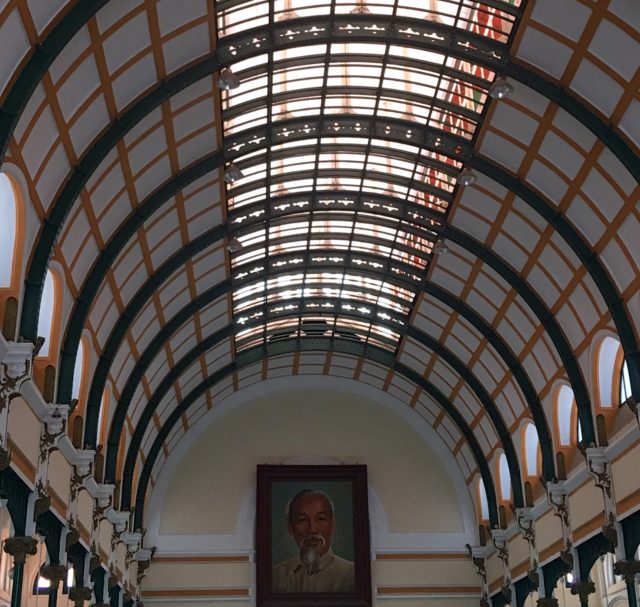
Make sure you take a selfie in front of this famous Ho Chi Minh landmark!
Close by is the Saigon Notre-Dame Basilica – a cathedral again established by French colonists, built between 1863 and 1880, with bell towers that are 58 metres high! Entry into the Cathedral is free and outside is the statue of the Virgin Mary that was said to have shed tears in 2005. (Do you remember this miracle making headlines in newspapers around the world?)
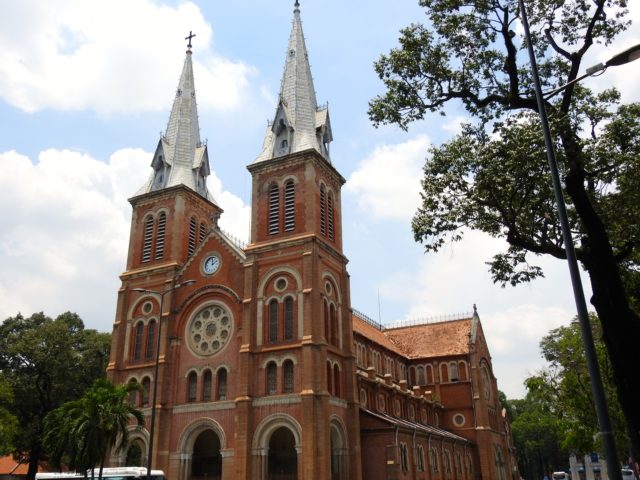
The Palace (originally called the Independence Palace and home to the President) will be of interest to many. Global history was made in 1975 when, at 10.45am on 30 April, a tank belonging to the North Vietnamese Army crashed through the main gate signifying the end of the Vietnam War.
This imposing five-story building has a warren of tunnels, a war room and telecommunications centre in the basement. The war command room still has maps on its walls and equipment of the day on display – all very confronting for those whose lives were in turmoil during the Vietnam War.
Walking through the rooms you get the feeling of being frozen in time since 1975. Two of the original tanks used in the capture of the palace are still parked in the grounds.
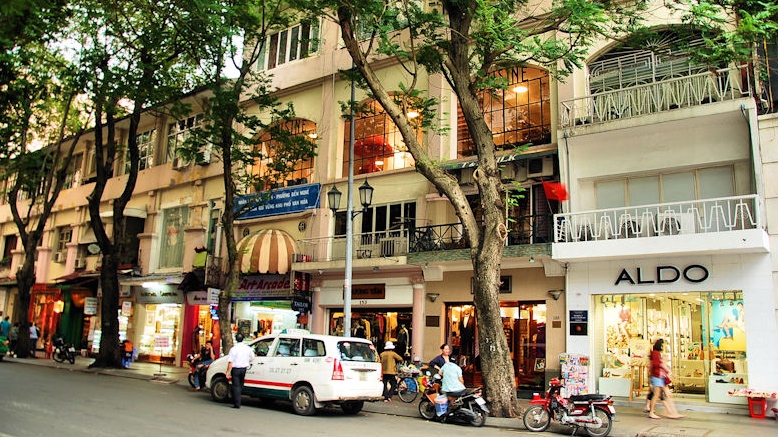
Dong Khoi Street, renamed after the Vietnam War, means Total Revolution and is is the luxury central district of Ho Chi Minh City.
This is the central point for the French colonial buildings which, apart from those already seen on the tour, includes the Saigon Opera House built in 1897 by French architect Ferret Eugene
Sadly, though, historical architecture is disappearing rapidly with many charming buildings of the colonial era already being demolished to make way for modern office and hotel buildings.
The street is only 600 metres long and starts from the Notre-Dame Cathedral at Saigon Paris Square and ends at Ton Duc Thang Street by the Saigon river.
Many high-end restaurants and famous hotels call this street home, including the Caravelle, Sheraton and Majestic Hotels, plus luxury retail outlets for those who feel like spoiling themselves.
With such a range of shops, boutiques and cafes, Dong Khoi Street is definitely the place to hang out if you have spare time in the city.
Local currency:
Viet Nam Dong – 20,000 = $1.15 AUS. It’s definitely handy to change a few dollars when you get to the city centre, particularly for Chinatown and small shops and cafes.
Weather:
So, there you have a guide to Ho Chi Minh City. Make sure your next cruise calls in to Phu My port, if only to experience firsthand the manic motorbikes!
A version of this post was originally published by Joycee Smith on her personal blog Gypsy at 60 and was shared with permission.